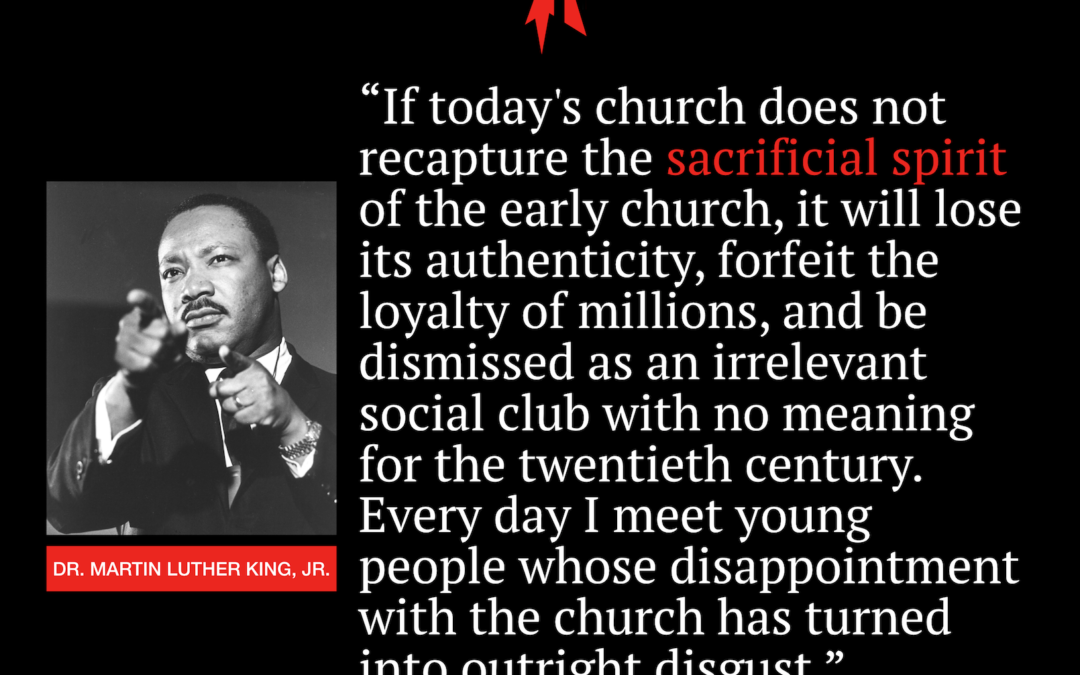
by Lance Cashion | Nov 4, 2019 | Christian Apologetics, Culture, Education, Encouragement, God, Leadership, Politics, Theology, Worldview
Martin Luther King Jr.’s “Letter From Birmingham Jail” continues to be relevant in our cultural moment. His words challenge the church to embrace it’s full purpose. The extent to which the Gospel of the Kingdom is proclaimed and integrated into the life of the church is the extent to which the church is relevant and effective in society.
The quiescent church is the gateway to injustice, brokenness and disorder. The witness of the church should be felt throughout the culture as the Gospel message empowers believers to pursue justice and reconciliation, serve the needy, create beauty and restore what is broken. The death, burial and resurrection of Jesus Christ for the forgiveness of sin transforms the believer. This Gospel, rightly lived out will teach, sanctify and transform the society in which believers dwell. It will be distinctly ‘sacrificial’, restorative and bold in its expression.
Martin Luther King Jr. operated from a distinctly Christian worldview. It informed his purpose, his view of reality and drove his behavior. This nation has benefited from his worldview and his actions. His challenge to the church echoes today. Dr. King knew what he was about. Do you know what you are about?
We know what our salvation saved us from (eternal separation from God’s presence, goodness and joy).
But a better question is;
What is our salvation for?
[Put another way, what is the purpose of our salvation?]
Read: Martin Luther King Jr. ‘Letter From Birmingham Jail’
Read previous post: Dear Mr. President – We are their only hope [Kurds]
If you wish to subscribe to this blog, please sign-up here. Every time I post something new, you will receive an email.

by Lance Cashion | Feb 14, 2018 | Leadership, Personal Growth
There are two kinds of leaders, good leaders and bad leaders.
Leadership is simply influence. Influence can be used for good or ill.
Hitler was a leader who used his influence for selfish evil purposes.
Mother Teresa was a leader who used her influence for selfless good purposes.
Take a moment and consider leaders throughout history both good and bad. What’s the difference between a Hitler and a Mother Teresa?
It boils down to two things that undergird how a leader wields their influence.
Humility and Virtue
Good leadership is rooted in thinking of others more than yourself (Humility). At the same time, good leadership has a moral compass or standard as a foundation (Virtue). There are other dimensions and aspects of leadership but humility and virtue are at the core of good leadership.
Everyone is a leader within their context. Everyone has influence. However, not every leader embodies humility and virtue.
Be a good leader.
Read previous post: Rescue them from evil – Prayer in 3D
If you wish to subscribe to this blog, please sign-up here. Every time I post something new, you will receive an email.
by Lance Cashion | Nov 5, 2017 | Personal Growth, Philosophy, Wisdom, Worldview
Unbridled skepticism undermines our thinking. It is a revolt against knowing.
The belief that nothing can be known for certain has run amuck in modern western culture. People claim they are absolutely certain that nothing can be known for certain.
Therefore, I refer to it as ‘unbridled’. Why do I say that?
The history of Western thought is for another day. Sufficed to say, during the Renaissance man made himself the center of all existence, completely autonomous and jettisoned meaning. This gave rise to humanism – which has no basis for right or wrong. In the 20th century, Post-modern philosophy claims that there is no objective truth (relativism).
Relativism is the root of unbridled (modern) skepticism. The presupposition of relativism is that objective truth cannot be known. This presupposition self-refutes because its an objective truth claim. In addition, it rejects any basis for knowing truth. Therefore, truth is subjective and relative to the individual (arbitrary). Unbridled skepticism manifests itself in contradiction, hypocrisy and ultimately futility. It undermines itself.
Conversely, I believe healthy skepticism is essentially a search for truth in the matter of things that matter most. In fact, in Greek, skeptomai means ‘to search, to think about or look for…’ The most important endeavor in life is the search for truth. Without it, existence is meaningless and leads to futility like doubting one’s own existence.
One must test a truth claim by asking two essential questions:
- Do the facts (claims) correspond to reality?
- Are the corresponding facts (claims) coherent? Or to put it another way, when you pull all of the corresponding facts together, do they make sense logically?
Unbridled skepticism constantly undermines itself because it’s based in relativism. Therefore, it can’t seek truth as healthy skepticism can because what the ‘unbridled’ skeptic is seeking is amorphous.
An anchor thrown into a cloud will not hold a vessel.
Unbridled skepticism rebels against knowing anything for certain.
I find G.K. Chesterton’s following statement interesting when I observe unbridled skepticism.
“All denunciation implies a moral doctrine of some kind and the modern skeptic doubts not only the institution he denounces, but the doctrine by which he denounces it. Thus he writes one book complaining that imperial oppression insults the purity of women, and then writes another book, a novel in which he insults it himself. As a politician he will cry out that war is a waste of life, and then as a philosopher that all of life is a waste of time. A Russian pessimist will denounce a policeman for killing a peasant, and then prove by the highest philosophical principles that the peasant ought to have killed himself. A man denounces marriage as a lie and then denounces aristocratic profligates for treating it as a lie.
The man of this school goes first to a political meeting where he complains that savages are treated as if they were beasts. Then he takes his hat and umbrella and goes on to a scientific meeting where he proves that they practically are beasts. In short, the modern revolutionist, being an infinite skeptic, is forever engaged in undermining his own mines. In his book on politics he attacks men for tramping on morality; in his book on ethics he attacks morality for tramping on men. Therefore the modern man in revolt becomes practically useless for all purposes of revolt. By rebelling against everything he has lost his right to rebel against anything.”
– G. K. Chesterton
You may or may not agree, but it is worth considering.
Read previous post: A Man’s Morning Prayer – November 4, 2017 . If you wish to subscribe to this blog, please sign-up here. Every time I post something new, you will receive an email.

by Lance Cashion | Jun 9, 2015 | God, News, Personal Growth, Philosophy, Trending Topics, Uncategorized, Wisdom
Darkness is defined as the “absence of light.” Goodness must have good as it’s source. The ancient Hebrews described this as ‘light’. Evil is the absence of good and described as ‘darkness’.
Evil (darkness) is not something. It is the lack of good (light).
The rightness of the moral law reflects the righteous source of the moral law.
“Righteous are you, O Lord, and right are your rules.” (Ps. 119:137)
An intrinsically good source produces goodness. It is reflective of it’s essence. Where there is no good, evil exists. Where there is no light, darkness exists.
“The unfolding of your words gives light;
it imparts understanding to the simple.” (Ps 119:130)

by Lance Cashion | Jan 15, 2015 | Education, Goal Setting, Jesus Christ, Lance's Philosophy, Leadership, News, Personal Growth, Relationships, Uncategorized, Wisdom, Worldview |
We take up our cause because we believe it is right and good. We know that it is good and we are passionate about reaching the good result. Somewhere along the path toward our goal of achieving what is right and good, we can fall into the trap of the wrong way.
Winning at all costs is not winning. “For what will it profit a man if he gains the whole world and forfeits his soul? Or what shall a man give in return for his soul?” (Mt. 16:26) If I have not love in my heart as I pursue what is right, I fail. If I love the object of the rightness of my cause and have no love for those on the path, I have created an idol. When my pursuit of what is right destroys fellowship and unity causing division, I have not love in my heart. I have gone the wrong way.
The heart will produce fruit that will manifest in reality. By the fruit, the wise can discern the motivation of the heart. We can attempt to manufacture ‘good fruit’ but eventually the facade will crumble and we will be found on the wrong way.
In the pursuit of doing the right thing, our way must be the way of love. It is a matter of the heart. The heart is the seat of the will. Our motivations are born in the heart.
The right way
A heart that is authentically regenerated and transformed will produce spiritual fruit in one’s life. “But the fruit of the Spirit is love, joy, peace, patience, kindness, goodness, faithfulness, gentleness, self-control; against such things there is no law.” (Gal 5:22-23).
The wrong way
A heart that is not transformed remains under the authority of darkness and rebellion is completely incapable of producing spiritual fruit in one’s life. The bible calls this state of the heart ‘the flesh.’ “Now the works of the flesh are evident: sexual immorality, impurity, sensuality, idolatry, sorcery, enmity, strife, jealousy, fits of anger, rivalries, dissensions, divisions, envy, drunkenness, orgies, and things like these…. those who do such things will not inherit the kingdom of God.” (Gal 5:19-21b)
Doing the right thing the wrong way
There are examples in the Bible of people doing the right thing the wrong way. Cain’s sacrifice was not pleasing to the Lord because of his motivation. Abraham and Sarah’s decision to use Hagar to provide an heir. Jacob and Rebekah’s deception of Isaac to attain Esau’s inheritance. Somewhere along the path toward their goal of achieving what is right and good, they fell into the trap of the wrong way.
How do we know we are doing the right thing the RIGHT way?
- Pray it through: Why am I really pursuing this ‘good thing’? Is it to earn points with God or man? What is truly motivating me? What is driving me toward this cause or goal?
- Check your fruit: Keep a journal on your journey and look for fruit.
- Test it with Scripture: Read God’s word and allow it to minister to you. Don’t treat it like a cafeteria where you pick and choose what supports your goal/mission.
- Be Accountable: ‘Iron sharpens iron.’ (Pr. 27:17) Share what you are doing with a brother or sister who will test you and hold you accountable. They must be able to ask the tough questions. Don’t trust yourself because you can deceive yourself. Get a trusted friend to help.
The way of love ties it all together.
“Grace and truth need each other. Grace ceases to be grace if it lacks truth. And truth loses its power if it lacks grace. Grace without truth sanctions and perpetuates unwanted actions…. Truth without grace is harsh, usually self-centered, and un-Christlike. Grace without truth is deceptively permissive, often lazy and equally un-Christlike… Should I show grace or should I tell the truth?’ Both. Love unites grace and truth.” – Bill Robinson




